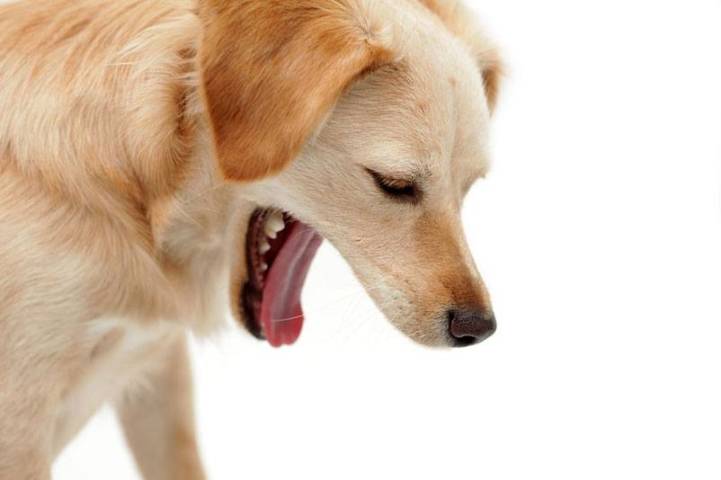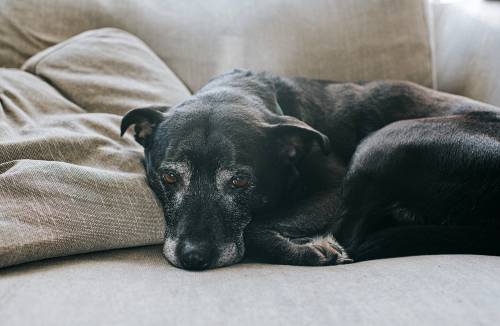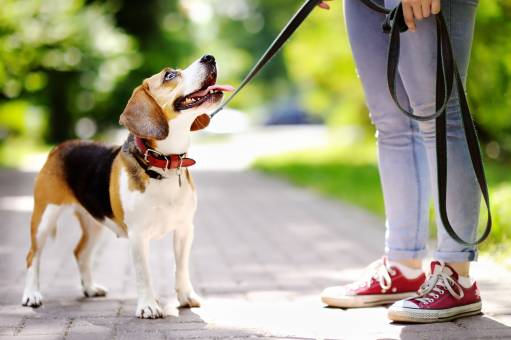Connect with a verified veterinarian in minutes. Licensed vets are available 24/7 to answer your questions. No need to worry about your furry family member.
Has your dog been dry heaving? That can be scary, especially if this is the first time. It’s sometimes hard to figure out if this is something to worry about or not.
So, we’ve put together some information about when a dog is dry heaving and what to watch for, as well as what you should do. Let’s get started!
What’s the Difference Between Dry Heaves, Gagging, and Vomiting?
While the sounds of dry heaving, gagging, and vomiting may be somewhat similar, these are actually different actions that are taking place.
With dry heaving, for instance, your dog may be trying to vomit. However, nothing comes up. You may see your dog’s body spasm, starting at the stomach and moving up toward the throat. This is very similar to retching.
When it comes to dog gagging, it may sound like your dog has something caught in his throat. You may notice your fur baby is having trouble breathing or swallowing. However, this is completely different from choking.
You’re probably more than familiar with vomiting. Your dog may make sounds and have spasms that come up from the stomach to his throat. However, he will produce vomit, which may include bile, the food he’s eaten, etc.
Most Common Causes of Dry Heaving in Dogs
Why is my dog dry heaving?
To answer this question, let’s take a look at some common causes of dry heaving in dogs:
1). Illness
Our dogs can become sick, just like us. In some cases, they can also capture contagious illnesses such as Bordetella or distemper. Distemper is an airborne illness, which spreads easily and quickly. It causes a dog to cough, develop a high fever, and the dog may have discharge from their nose and eyes.
There’s a vaccination that your dog can get, which will keep him from catching distemper. Distemper usually is curable in adult dogs; however, it can quickly kill puppies if untreated.
Bordatella, also known as kennel cough, is another contagious canine illness. Dogs usually catch this illness when kept in confined spaces with other dogs, such as in a kennel. Kennel cough causes a cough that sounds very similar to dry heaves. Respiratory illnesses and respiratory infections such as kennel cough can quickly cause dehydration in dogs. This is especially true if your dog does not drink enough water to stay hydrated.
When you dog keeps coughing, the trachea can become blocked. This can lead to dry heaving, which is one of the most common causes of vomiting in dogs. If your dog’s trachea is blocked, he may not be able to breathe properly.
In addition, Laryngeal paralysis is a condition that can cause your dog to have dry heaves. This is a disease that affects the larynx, which is located in the throat. It’s an uncommon condition that affects dogs of all ages. It’s not known exactly what causes this disease, but it’s believed to be a genetic disorder.
This disease causes the muscles to become paralyzed and stop working properly. This can result in laryngospasm, which means the muscles become spastic and try to squeeze air out of the dog’s lungs when he or she tries to speak or swallow.
2). Parasite Infections
Parasites are another common illness in dogs. All it takes is the bite of one flea to infect a dog with parasites.
Roundworms are one of the most common parasites that can infect dogs. These worms can eventually make their way to the dog’s lungs and windpipe, causing dry heaving.
Tapeworms are another common worm in dogs. These can also cause a persistent cough that resembles dry heaves.
Heartworms are also very common in our canine companions. Once inside your dog, they can eventually migrate to the dog’s heart and lungs. They can cause dry heaving and other symptoms. Left untreated, heart worms can lead to death.
Most parasites are easy to take care of. You can have your dog checked once a year for parasites or if he’s showing symptoms such as a cough or dry heaves. There’s medication available to kill the parasites and help your dog recover.
3). Foreign Objects
Because dogs love to eat anything and everything, it’s possible that a dog may swallow a foreign object that causes him to have dry heaves. This is because the small item, such as a toy, a button, etc. can become lodged in the windpipe.
Dogs try to remove the stuck item with the dry heaves. It’s possible the item can become dislodged in this way, but it’s always the best thing to give your dog veterinary care in this case. This is considered an emergency situation and it’s best to get medical advice as soon as possible. An X-ray may be needed to make sure the item has not become lodged in the windpipe.
While hairballs are common in dogs, this is a more serious issue than most people realize. Hairballs are often seen in older dogs and can cause blockages in the intestines. In these cases, your dog may be unable to pass stool, and he may have difficulty breathing.
4). Blocked Airways
Dogs can also suffer from blocked airways, which can cause dry heaves. The airways can become blocked due to tumors in the throat, tonsilitis, or even pharyngitis. These conditions can cause swelling in the throat, which leads to dry heaves.
5). Bloat
Canines can develop a painful, life-threatening condition called bloat. This is also called gastric dilation volvulus (GDV), which can lead to death if not treated promptly.
With GDV, a dog’s stomach fills with air, causing the organ to expand quickly. This can cause the stomach to twist, cutting off the blood supply. One of the symptoms can include dry heaves.
Again, this is a very serious condition that must be treated quickly by a vet; otherwise, it can cause death.
6). Eating Too Fast
Another common cause of dry heaves in dogs is if they eat their food too fast. Some dogs tend to snarf up their food too quickly, which can make swallowing difficult. Some pieces of dog food may not be chewed completely, for instance, and can become lodged in the throat or the windpipe.
For dogs that seem to have dry heaving every time they eat, it can help to buy a slow feeder. These are special dog food bowls that make a dog take smaller bites and eat more slowly. This cuts down on dry heaves, too.

Review symptoms, medications & behavior to keep your pets healthy with a Vet Online in just minutes.
Ask a Vet Live NowWhen to Worry About Dry Heaves?
Most dogs will occasionally have bouts of dry heaving that are not caused by a serious health issue. However, if your dog seems to be having dry heaves regularly, then that’s concerning. You can watch for other symptoms that may accompany dry heaves, including:
- Runny nose & sneezing
- Fever
- Lethargy
- Pacing or restlessness
- Hard, swollen abdomen, may be accompanied with pain
- Excessive licking of lips and/or drooling
- Pale gums
- Labored breathing
- Foaming at the mouth
- Coughing
- Diarrhea
- Vomiting
- Difficult breathing
- Dog seems distressed
If you notice these symptoms in your dog, then it’s a good idea to call the vet right away. It could be a medical emergency.
What Should You Do When Your Dog Dry Heaves?
Large breeds such as the German Shepherd, Great Danes, Labrador, and Retrievers are prone to dry heaves. While this may be annoying, it’s important to remember that dog coughing and dry heaving is a common condition in dogs. Your pooch may need veterinary care, but this is an emergency situation.
Most of the time, when your dog is dry heaving, the best thing you can do is to try to get him to relax. He may be stressed out, scared, or feeling uncomfortable.
There are a few things you can do to help him with this:
Make sure he’s not eating too much food at one time. For instance, make sure that he doesn’t eat in one sitting. Don’t let him eat until he’s ready for bed. Keep his meals and snacks low-calorie and light in texture so that his stomach isn’t filled up too much at once. Give him water when you see him beginning to gag or retch. Gently pull on his muzzle so that he can spit out the food or water that he might have swallowed while dry heaving. Make sure that there are no rocks or other objects in his mouth while you dog’s vomiting. If there are any objects in his mouth, gently remove them before offering him any water or food again.
Keep in mind that when you dog eats, it’s important that he doesn’t eat too much at once. Their gag reflex can take some time to kick in, so if he’s had too much at once, it could be too much for his stomach to handle. Kibble is much more dense than water, so it can be hard for a dog to digest and assimilate all of the food in one sitting.
As mentioned, dry coughing or choking can also be an indication that your dog has swallowed something, or he may have been chewing on something too hard. The esophagus can become swollen and it can be hard for him to swallow, especially if he’s eating too much at once.
Summing It Up
Most of the time, dry heaving occasionally isn’t caused by anything serious. However, if your dog begins to have dry heaving more often and it’s accompanied by other symptoms, then it’s time to call the vet.
In some of the reasons for dry heaves mentioned above, it’s possible to prevent the symptoms. This is the case with worms, problems such as kennel cough, distemper, etc. Your dog should have regular vaccinations and be dewormed when necessary.
Just be sure to keep an eye on your dog and his condition every day. Then act fast if he shows any concerning signs. You may just save your dog’s life.
Connect with a verified veterinarian in minutes. Licensed vets are available 24/7 to answer your questions. No need to worry about your furry family member.

Kim
Kim is a talented author, who loves animals especially dogs. She engaged in writing books and articles relating to animals a decade ago. Kim resides in Chicago with her husband and son. The family is the proud owner of a dog and a parrot (Jack and Lily). Kim wanted more than these two pets, but her husband put his foot down... She often visits elementary schools to talk to the kids about what she learned about pets and how they could learn from them.
Review symptoms, medications & behavior to keep your pets healthy with a Vet Online in just minutes.
Ask a Vet Live Now




